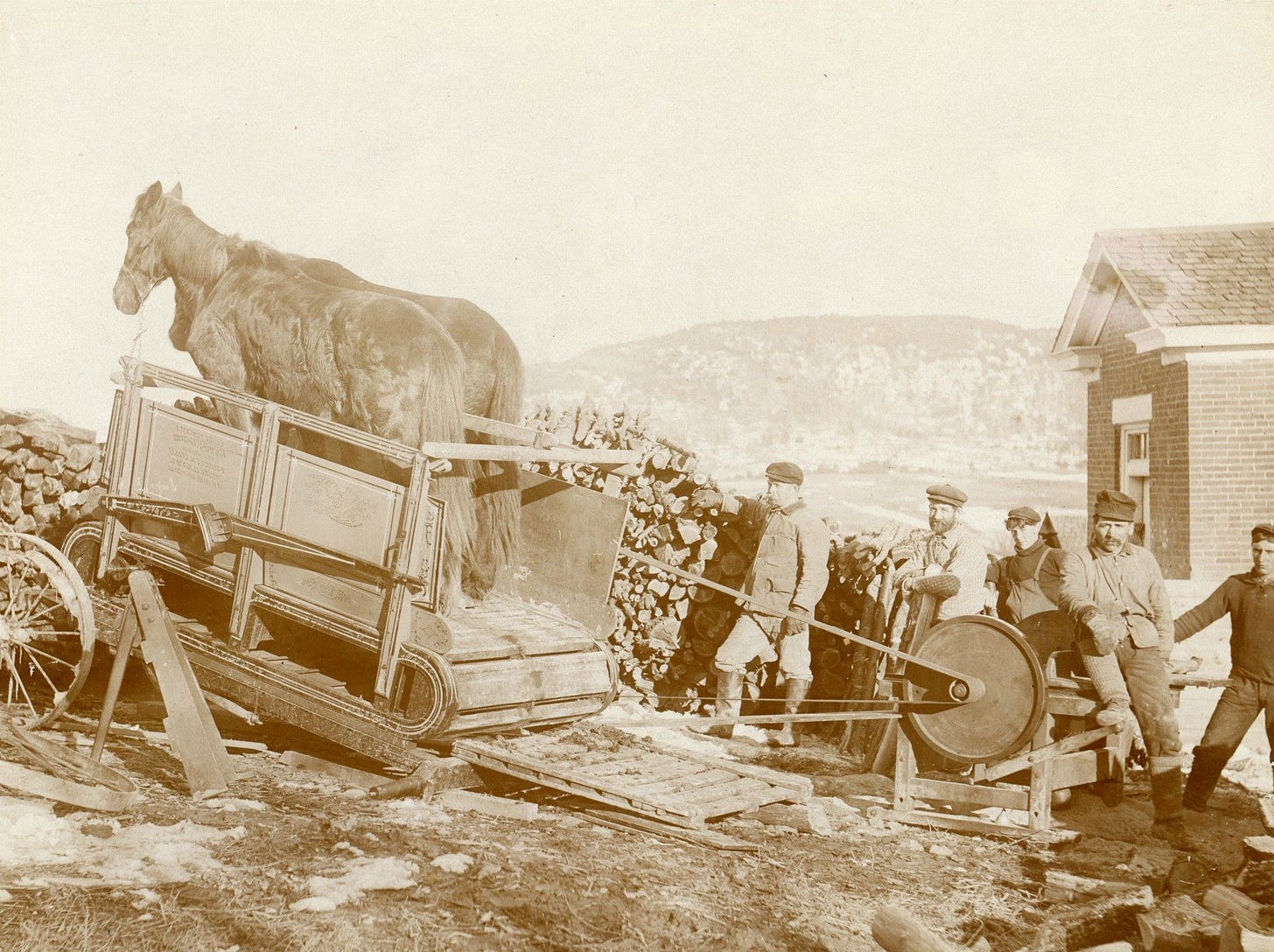The Sawmill Accident That Claimed My Great-Great-Grandfather's Right Arm — And How I Found Out About It
Wednesday, July 22, 1903: "[Mr. Morrison's] elbow was badly mangled and fears are entertained that he may lose his arm."
I can barely focus enough to write.
The other night, I was sifting through Ancestry’s online newspaper archives for any hits on my great-great-grandfather: a 6’7” policeman named Samuel Morrison. I clicked on one hit, and what I read stopped me cold. It said:
Portland Evening Press — Wednesday, July 22, 1903
Mr. Samuel Morrison, one of Woolwich’s best citizens, met with a most serious accident Tuesday afternoon which may result in the loss of his right arm. He was engaged with C.W. Wright in sawing cordwood with a horse power machine and the work had been very nearly finished. His elbow was badly mangled and fears are entertained that he may lose his arm. Dr. Marsh of Bath was called. Mr. Morrison is about forty-eight years old and a farmer.
Two days later (Friday, July 24, 1903), the Daily Kennebec Journal published a follow-up confirming the worst: amputation.
The saw struck a hitch or knot in the wood and one end of the board was thrown so that it struck Mr. Morrison in an arm with force enough to make amputation necessary. He was immediately taken to the Portland hospital.
I thought there was no way this Samuel Morrison could be my great-great-grandfather. But I couldn’t stop thinking about it. On a whim, I sent my granduncle a message. I knew he didn't meet Samuel Morrison — his grandfather — but if anybody had a clue, he would. I sent him a picture of one of the headlines and asked: Do you know if your grandfather, Samuel Morrison, lost an arm during his life?
Eight hours later, he confirmed it.
Samuel Morrison, my 6’7” great-great-grandfather, and Samuel Morrison, the 48-year-old farmer who lost his right arm in 1903, were the same man.

Samuel Morrison was only 45 when the accident happened in 1903. He immigrated to Maine from New Brunswick a decade earlier and was married with six kids. Three years before the accident, an article published in The Bangor Daily News on October 17, 1900, described his life:
[Samuel Morrison] amassed sufficient funds to enable him to settle down on his well arranged and productive farm. With a wife and six children, including twins, he is the picture of domestic bliss. Mr. Morrison, although engaged in agricultural pursuits largely, finds time to cultivate his mind, is an omnivorous reader and something of a disputant.
According to the local newspaper, Samuel worked hard for decades and finally had the life he wanted. But he only got to enjoy the bliss for three years before, in an instant, everything changed.

Samuel was operating a horse-powered saw and cutting cordwood (firewood) when the heavy saw hit a knot in the wood. The saw hurled the wood right into his right arm. Even at 6’7” and 225 pounds, Samuel was no match for it. Doctors at Portland hospital decided that amputation was the only way forward.
Samuel sued Charles W. Wright, who owned the sawmill, for $5,000 in 1903 ($175,363 in 2023). The case dragged on for three years. In 1906, Judge Spear of Portland awarded Samuel Morrison just $736 ($25,813 in 2023).

Unable to farm, Samuel quickly pivoted careers. By August 1905, he was a night watchman at a shoe factory in Freeport. Shoemaking boomed there at the turn of the twentieth century. Leon Leonwood Bean (L.L.Bean) even opened his first shoe factory there in 1912! Maybe Samuel worked for him at some point.
Samuel died in 1933, thirty years after the accident. He was still a night watchman in 1930 at age 75 — for three decades, he stayed up all night and slept during the day. To say his life changed dramatically on that summer afternoon in 1903 would be an egregious understatement. Although we’ll never know, I like to imagine that Samuel found a way to continue to enjoy the life he worked so hard to build with his family, even in the face of tremendous adversity.
Tips: Sometimes, you might come across a discovery that you think doesn't match up with your ancestor.
Keep an open mind when you stumble across unexpected or surprising family details. Sometimes findings that initally seem far-fetched end up fitting into the genealogical puzzle.
Most importantly, remember to ask family members if they have any insights into what you find in the archives. My granduncle blew this mystery wide open!
Jack Palmer is a History and Psychology double-major at Duke University. I’ve done genealogy research since I was 10 and love writing about it for family, friends, and anybody else who might enjoy a blast from the past.




I found a 1945 article about my great grandfather when he was 80, he lost his right hand. He was still teaching school at the time which was what most of the article was about. This would have been 1874.
Strimple lost his right hand and lower part of his arm as a boy of nine in a mill, when he was helping his father and hired hand cut cane. They placed the boy on the kitchen table and, after a druggist had administered chloroform, the mangled hand was taken off with a meat saw. “They did a good job, I've never had any trouble with it”.